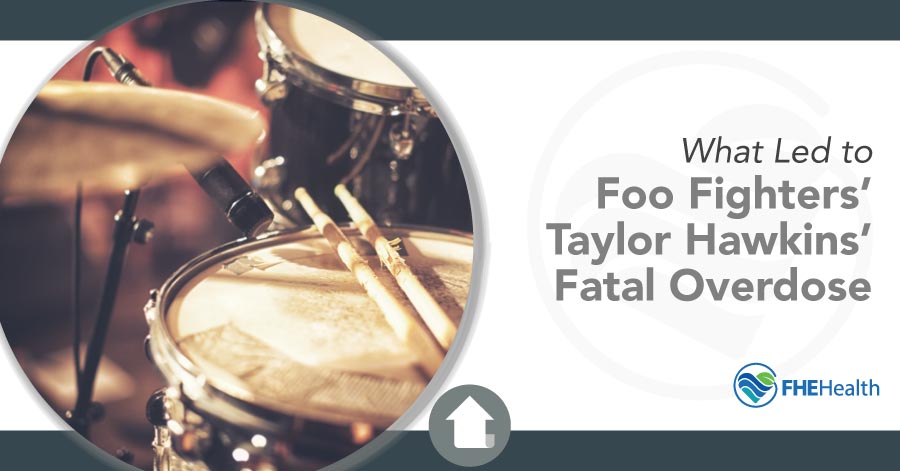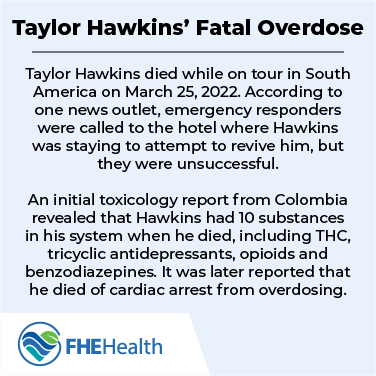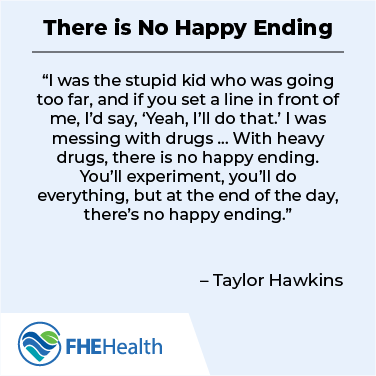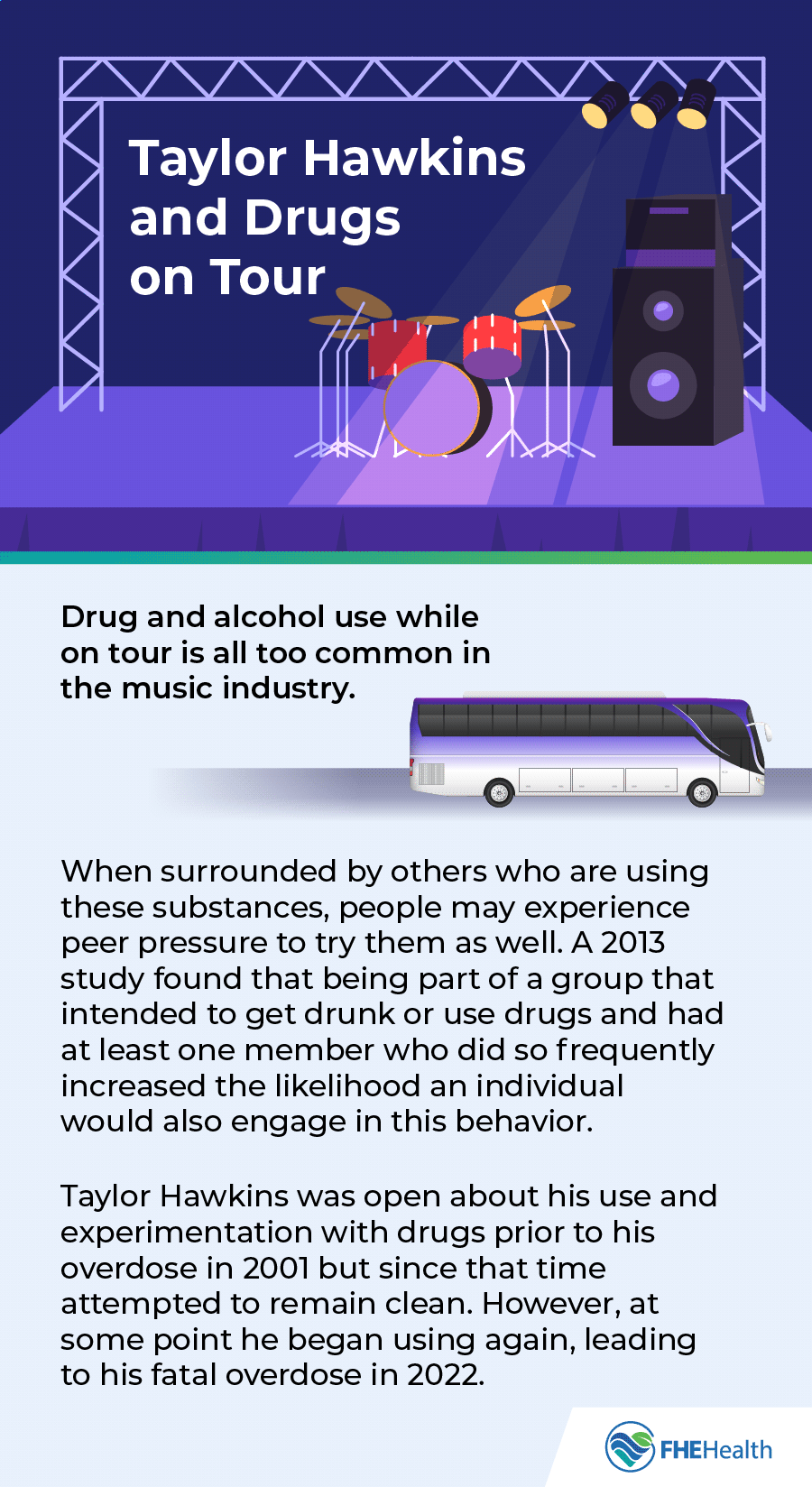
On March 25, 2022, the world mourned the tragic death of Taylor Hawkins, the drummer from the band Foo Fighters.
According to a preliminary toxicology report, 10 types of substances, including THC, Tricyclic antidepressants, benzodiazepines and opioids, were found in his system. The authorities in Colombia stated they would continue to work toward clarity on the events leading to his death and would report on the results ‘in a timely manner.’ He was only 50 years old.
Taylor Hawkins’ sudden death shook his fans, many of whom had traveled to Colombia from other parts of South America for the concert on this leg of the Foo Fighters Tour. Find out how the musician’s struggle with drug addiction and his overdose are impacting the conversation around drug abuse and mental health.
Need Help?
Treatment can begin quickly and discreetly, get started now

Foo Fighters Drummer Taylor Hawkins’ Cause of Death
Foo Fighters’ drummer, Taylor Hawkins, died while on tour in South America on March 25, 2022. The news of his death broke on a Friday as the Foo Fighters were scheduled to perform a concert in Bogota, Colombia. According to one news outlet, emergency responders were called to the hotel where Hawkins was staying to attempt to revive him, but they were unsuccessful.
The concert was canceled once the news of his death became public. An initial toxicology report from Colombia revealed that Hawkins had 10 substances in his system when he died. These included THC, tricyclic antidepressants, opioids and benzodiazepines. On March 27th, The Daily Mail reported, based on Colombian news magazine Semana, that Hawkin’s heart was double the average size for a man his age and that investigators concluded that he had suffered cardiovascular collapse after binging on a cocktail of drugs. The report went on to state that the Foo Fighter’s drummer had overdosed on heroin mixed with antidepressants and benzodiazepines.
It should be noted, that only the only official statement from the authorities was the initial toxicology statement regarding the 10 substances found, at the time of writing this article it is not known whether a public statement will be made. Some other theories include a ‘heavy heart’ condition combined with a grueling touring schedule and the increased altitude of Bogota.
Taylor Hawkins’ Career as Drummer for the Foo Fighters
Taylor Hawkins has left his mark on the world as a music icon, with thousands of fans from countries across the globe. However, his career reaches much further back than his success as the Foo Fighters’ drummer. He started off playing in the Orange County experimental band Sylvia before he got his big break touring Europe with British-Canadian rock singer Sass Jordan in 1994.
After that, he went on to become the drummer for Canadian-American singer-songwriter Alanis Morissette for two years. That was his last gig before joining Foo Fighters in 1997, the role that would lift him to stardom.
Taylor Hawkins played with Foo Fighters from 1997 to 2022, recording nine albums in that time. Besides his musical contribution, he also appeared in the 2011 “rockumentary,” Foo Fighters: Back and Forth. The documentary, directed by James Moll, follows the band as they record their seventh album.
Taylor Hawkins and Drugs on Tour
It’s common in the music industry for musicians to indulge in drug and alcohol use while on the road. Studies show a link exists between drugs like LSD and the emotional response to music, potentially explaining why many people use drugs while writing songs or attending concerts. Abusing drugs is always a risk and can result in addiction to these illegal substances.
When surrounded by others who are using these substances, people may experience peer pressure to try them as well, or they may simply think it’s no big deal because everyone else is doing it. A 2013 study found that being part of a group that intended to get drunk or use drugs and had at least one member who did so frequently increased the likelihood an individual would also engage in this behavior.
Hawkins was open about his use and experimentation with drugs prior to his overdose in 2001, but since that time, he has attempted to remain clean. However, at some point, the Foo Fighters’ drummer began using again, leading to his fatal overdose in 2022.
Start Treatment Now
Treatment can begin quickly and discretely, get started now
A History of Substance Abuse
Although Taylor Hawkins’ passing was sudden and unexpected, this was not the first time it became public knowledge that the drummer struggled with drug abuse and addiction. He previously had a brush with overdosing and spoke publicly about his journey to recovery. Taylor Hawkins’ London overdose incident occurred in August 2001.
The Foo Fighters’ drummer overdosed on heroin and ended up in a coma for two weeks. With Taylor Hawkins hospitalized, the rest of the Foo Fighters band spoke up about mental health and addiction. David Grohl, the singer and guitarist for the Foo Fighters, remained at Hawkins’ side throughout his hospital stay.
Taylor Hawkins’ 2001 overdose prompted Grohl to tell the Guardian, “When Taylor wound up in hospital, I was ready to quit music. Because to me, it felt like music equaled death. I started praying. I’ve never been to church in my life, and I’m walking back from Taylor’s hospital to our hotel every night, praying out loud in the streets of London.” The singer continued, “I’ve seen so many people just lose it all with drugs and die. So I freaked out.”
At the time of that interview in 2011, Hawkins was believed to be clean and in recovery. However, addiction recovery is an ongoing process that requires constant work, self-care and vigilance. Studies indicate that approximately 85% of drug addicts experience a relapse within the first year of recovery. That’s why professional support programs and a network of people encouraging sobriety are essential to staying clean.
Hawkins’ Own Words on His Addiction
 When referencing his 2001 overdose, Hawkins said, “I was the stupid kid who was going too far, and if you set a line in front of me, I’d say, ‘Yeah, I’ll do that.’ I was messing with drugs.” He continued by saying, “With heavy drugs, there is no happy ending. You’ll experiment, you’ll do everything, but at the end of the day, there’s no happy ending.”
When referencing his 2001 overdose, Hawkins said, “I was the stupid kid who was going too far, and if you set a line in front of me, I’d say, ‘Yeah, I’ll do that.’ I was messing with drugs.” He continued by saying, “With heavy drugs, there is no happy ending. You’ll experiment, you’ll do everything, but at the end of the day, there’s no happy ending.”
Sadly, this sentiment turned out to be true in his case. Hawkins’ words serve as a source of caution to individuals who are simply “experimenting” with hard drugs. These substances are highly addictive and can quickly cause you to become dependent on them.
Hawkins himself warned in a 2018 interview, “If you have an addictive personality, you’re gonna get drawn into it. You gotta be careful, man.” Hawkins also told Kerrang! in 2019, “Everyone has their own path, and I took it too far. I was partying in London one night, and I mistakenly did something, and it changed everything.”
Keeping the Conversation Going
Celebrities who suffer fatal overdoses are missed by their fans and leave an important message behind them. They become examples of the dangers of drug abuse, and their passing encourages people to talk about how to support someone’s mental health when they’re living with addiction.
The Foo Fighters’ drug overdose awareness efforts are one example of how celebrities are shaping the conversation. David Grohl no longer does drugs and hasn’t for a while because he’s seen the tragic effects they can have.
He says, “If I could grab every person who thinks that’s the way you should live your life and sit them down and say, ‘Listen to these horror stories,’ they’d maybe think differently. But who am I to tell anyone else how to live their life?”
Get the Help You Need
At FHE Health, our team of compassionate counselors can take your call 24/7 to start your journey to recovery. We offer inpatient and outpatient addiction treatment options, medical detox programs and therapy. Call us today at (833) 596-3502 to learn more.
Start the admission process
100% free and confidential insurance verification with a counselor
About Chris Foy
Chris Foy is a content manager and webmaster for FHE Health with years of experience in the addiction treatment industry...read more







